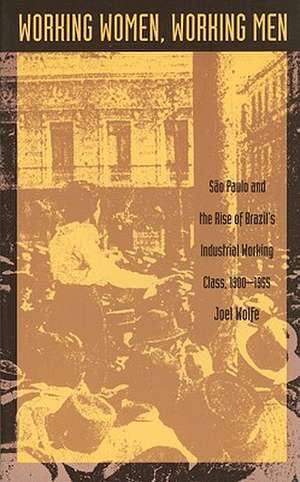Working Women, Working Men – Sao Paulo & the Rise of Brazil′s Industrial Working Class, 1900–1955
Autor Joel Wolfeen Limba Engleză Paperback – 27 mai 1993
Drawing on a diverse range of sources--oral histories along with union, industry, and government archival materials--Wolfe's account focuses not only on labor leaders and formal Left groups, but considers the impact of grassroots workers' movements as well. He pays particular attention to the role of gender in the often-contested relations between leadership groups and thee rank and file. Wolfe's analysis illuminates how various class and gender ideologies influenced the development of unions, industrialists' strategies, and rank-and-file organizing and protest activities.
This study reveals how workers in Sao Paulo maintained a local grassroots social movement that, by the mid-1950s, succeeded in seizing control of Brazil's state-run official unions. By examining the actions of these workers in their rise to political prominence in the 1940s and 1950s, this book provides a new understanding of the sources and development of populist politics in Brazil.
Preț: 270.42 lei
Nou
Puncte Express: 406
Preț estimativ în valută:
51.75€ • 56.43$ • 43.63£
51.75€ • 56.43$ • 43.63£
Carte tipărită la comandă
Livrare economică 24 aprilie-08 mai
Preluare comenzi: 021 569.72.76
Specificații
ISBN-13: 9780822313472
ISBN-10: 0822313472
Pagini: 328
Dimensiuni: 144 x 227 x 27 mm
Greutate: 0.6 kg
Editura: MD – Duke University Press
ISBN-10: 0822313472
Pagini: 328
Dimensiuni: 144 x 227 x 27 mm
Greutate: 0.6 kg
Editura: MD – Duke University Press
Recenzii
ÒWolfe takes a candid look at the Brazilian working-class movement through his study of the Sao Paulo textile and metal workers viewed from the perspective of the factory-level organizations created by workers to confront emplyers. [He] skillfully brings together extensive documentary and oral history sources uncovering evidence that questions. . .myths that Brazilian labor scholarship has been reluctant to expose. . . . In the context of current Brazilian labor scholarship few studies have so critically looked into the dynamics of the labor movement like this book has, and because of this it should become a reference for future studies.Ó --Salvador A. M. Sandoval, Labor History
oWolfe takes a candid look at the Brazilian working-class movement through his study of the Sao Paulo textile and metal workers viewed from the perspective of the factory-level organizations created by workers to confront emplyers. [He] skillfully brings together extensive documentary and oral history sources uncovering evidence that questions...myths that Brazilian labor scholarship has been reluctant to expose... In the context of current Brazilian labor scholarship few studies have so critically looked into the dynamics of the labor movement like this book has, and because of this it should become a reference for future studies.O --Salvador A. M. Sandoval, Labor History
oWolfe takes a candid look at the Brazilian working-class movement through his study of the Sao Paulo textile and metal workers viewed from the perspective of the factory-level organizations created by workers to confront emplyers. [He] skillfully brings together extensive documentary and oral history sources uncovering evidence that questions...myths that Brazilian labor scholarship has been reluctant to expose... In the context of current Brazilian labor scholarship few studies have so critically looked into the dynamics of the labor movement like this book has, and because of this it should become a reference for future studies.O --Salvador A. M. Sandoval, Labor History
Textul de pe ultima copertă
"No area has been so misunderstood by foreign researchers as labor and union history in Brazil. This book sets high standards for any new studies on Brazil, Latin America, or even the rest of the world."--Michael L. Conniff, Auburn University
